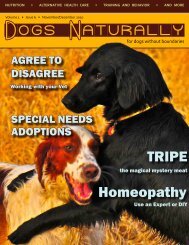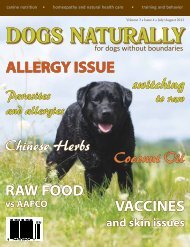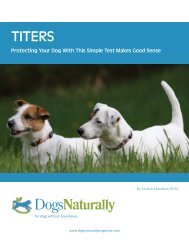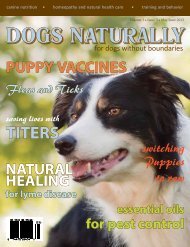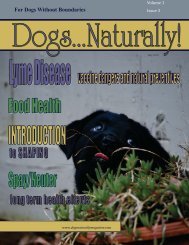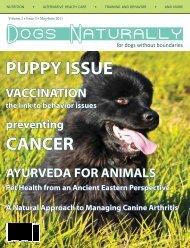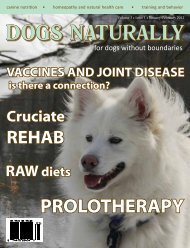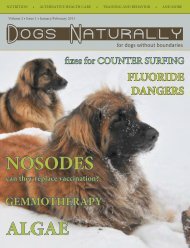For Dogs Without Boundaries - Dogs Naturally Magazine
For Dogs Without Boundaries - Dogs Naturally Magazine
For Dogs Without Boundaries - Dogs Naturally Magazine
Create successful ePaper yourself
Turn your PDF publications into a flip-book with our unique Google optimized e-Paper software.
the end of this article.<br />
Genetic Screening for Thyroid Disease<br />
Complete baseline thyroid panels and<br />
thyroid antibody tests can be used for<br />
genetic screening of apparently healthy<br />
animals to evaluate their fitness for<br />
breeding. Any dog having circulating antithyroid<br />
auto antibodies can eventually<br />
develop clinical symptoms of thyroid<br />
disease or be susceptible to other autoimmune<br />
diseases because their immune<br />
system is l breeding stock.<br />
Thyroid testing for genetic screening<br />
purposes is unlikely to be meaningful<br />
before puberty. Screening is initiated,<br />
therefore, once healthy dogs and bitches<br />
have reached sexual maturity (between<br />
10-14 months in males and during the<br />
first anestrous period for females following<br />
their maiden heat). Anestrus is a<br />
time when the female sexual cycle is<br />
quiescent thereby removing any influence<br />
of sex hormones on baseline thyroid<br />
function. This period generally begins<br />
12 weeks from the onset of the previous<br />
heat and lasts 1 month or longer.<br />
The interpretation of results from baseline<br />
thyroid profiles in intact females is<br />
more reliable when they are tested in<br />
anestrus. Thus, testing for health screening<br />
is best performed at 12-16 weeks<br />
following the onset of the previous heat.<br />
Screening of intact females for other<br />
parameters like vWD, hip dysplasia, inherited<br />
eye disease, and wellness or reproductive<br />
checkups should also he<br />
scheduled in anestrus.<br />
Once the initial thyroid profiles are obtained,<br />
dogs and bitches should be rechecked<br />
on an annual basis to assess<br />
their thyroid and overall health. Annual<br />
results provide comparisons for early<br />
recognition of developing thyroid dysfunction.<br />
This permits treatment intervention,<br />
where indicated, to avoid the<br />
appearance or advancement of clinical<br />
signs associated with hypothyroidism.<br />
<strong>For</strong> optimal health, young dogs under<br />
15-18 months of age should have<br />
thyroid baseline levels in the upper half<br />
of the adult normal ranges. This is because<br />
puppies and adolescent dogs require<br />
higher levels of thyroid hormones<br />
as they are still growing and maturing.<br />
Similarly, older animals beyond 8 or 9<br />
years of age have slower metabolisms<br />
and so baseline thyroid levels of normal<br />
(euthyroid) dogs may be slightly below<br />
midrange. <strong>For</strong> optimum thyroid function<br />
of breeding stock, levels should be close<br />
to the midpoint of the laboratory normal<br />
ranges, because lower levels may be indicative<br />
of the tarry stages of thyroiditis<br />
among relatives of dog families previously<br />
documented to have thyroid disease.<br />
The difficulty in accurately diagnosing<br />
early thyroid disease is compounded by<br />
the fact that some patients with typical<br />
clinical signs of hypothyroidism have<br />
circulating thyroid levels within the normal<br />
range. A significant number of these<br />
patients will improve clinically when<br />
given thyroid medication. In such cases,<br />
blood levels of the hormones can be normal<br />
but tissue levels are inadequate to<br />
maintain health, and so, the patient<br />
shows clinical signs of hypothyroidism.<br />
This situation pertains in selenium deficiency<br />
(discussed below). While animals<br />
in this category should respond well to<br />
thyroid medication, only experienced<br />
clinicians are likely to recognize the need<br />
to place these dogs on a 6-8 week clinical<br />
trial of thyroid supplementation. This<br />
approach is safe and clinically appropriate,<br />
but it requires rechecking blood levels<br />
of thyroid hormones towards the end<br />
of the 6-8 week period to assure that the<br />
patient is receiving the correct dose of<br />
medication.<br />
Other Factors Influencing Thyroid Metabolism<br />
Because animals with autoimmune thyroid<br />
disease have generalized metabolic<br />
imbalance and often have associated<br />
immunological dysfunction, it is advisable<br />
to minimize their exposures to unnecessary<br />
drugs, toxins, and chemicals,<br />
and to optimize their nutritional status<br />
with healthy balanced diets. Wholesome<br />
nutrition is a key component of maintaining<br />
a healthy immune system. In our<br />
experience, families of dogs susceptible<br />
to thyroid and other autoimmune diseases<br />
show generalized improvement in<br />
health and vigor when fed premium cereal-based<br />
diets preserved naturally with<br />
vitamins E and C (without the addition of<br />
chemical antioxidant preservatives such<br />
as BHA, BHT, or ethoxyquin). Fresh<br />
home-cooked vegetables with herbs,<br />
low fat dairy products, and meats such<br />
as lamb, chicken, and turkey can he<br />
added as supplements. Challenging the<br />
immune system of animals susceptible<br />
to these disorders with polyvalent modified-live<br />
vaccines has been associated<br />
with adverse effects in some cases.<br />
Table 1 lists other agents that should be<br />
avoided in susceptible or affected animals.<br />
Nutritional influences can have a profound<br />
effect on thyroid metabolism. <strong>For</strong><br />
example, iodine deficiency in areas<br />
<strong>Dogs</strong>...<strong>Naturally</strong>! January/February 2010 | 38




